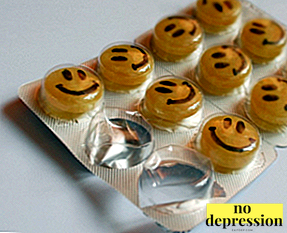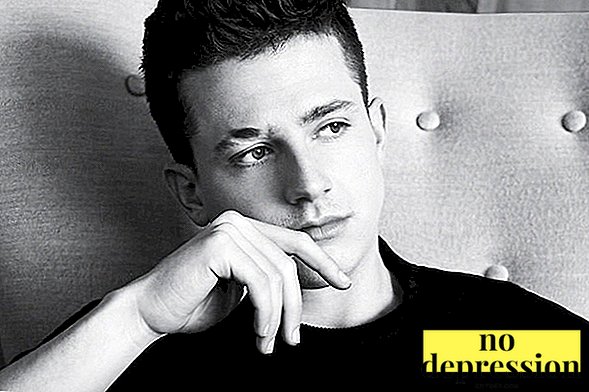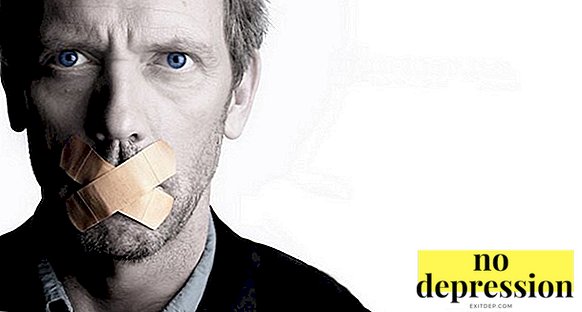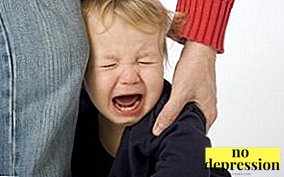The task of antidepressants is to optimize brain function, restoring the normal level of monoamines - a group of hormones responsible for emotions.
As soon as the amount of these hormones in the body is restored, the person returns to normal. The higher their level, the better health of the patient. But is there an antidepressant without side effects?
Human impact

How do antidepressants affect a person?
Contrary to common mythsMost antidepressants do not cause addiction if taken correctly and do not worsen the patient’s health.
But they also cannot solve all the problems of a person and instantly improve their well-being.
Most of the drugs you can stop taking without any serious consequences. Some medications require a slow and gradual reduction in dosage.
There is, of course, a certain type of drugs that causes serious dependence, but doctors almost never discharge them. Also, antidepressants do not affect the personality of a person. In general, if you take them on the instructions of the doctor, they work as intended and really help.
However, some pills cannot cure depression completely. In most cases, the disease is accompanied by psychological factors that caused it.
Therefore, antidepressants help get rid of the symptoms of depression, but do not treat it in the bud. For full treatment requires psychotherapy.
How do antidepressants work? Find out from the video:
Should I use?
Antidepressants have a positive effect if you take them as recommended by the doctor in the right dosage.
At the same time, you need to have medical evidence that you have depression (or another disorder in which these drugs are prescribed), because taking antidepressants without a source of illness is addictive and even more serious health problems.

Do not take antidepressants yourself, even if you are completely confident in the diagnosis and your actions, and even if you have already suffered from depression before.
Types of disease may vary, depending on the situation, different medications and dosages may be required.
Most likely, an independent medication not only does not help, but also will hurt.
Antidepressants - myths and facts, personal experience:
Who writes out?
Prescribed doctors prescribe antidepressants. In normal clinics for the recipe is sent to to the neuropathologist.
Depending on the situation, a psychiatrist, a psychotherapist with the right to provide pharmacological assistance (that is, who has the right to prescribe pills) or a psychologist with a medical license can prescribe a prescription.
In other cases, such as neurological diseases, antidepressants prescribe neurologist.
How to get a recipe?
Ordinary doctors (neuropathologists in polyclinics, general practitioners) simply recommend which medications to take, but to take some of them. may need a recipe.
To obtain it, you need to contact a psychiatrist or psychotherapist who has the right to medical care. They will make an official diagnosis and prescribe antidepressants. These same doctors should further monitor well-being patient and in which case change the course of treatment.
Non-prescription antidepressants:
Treatment rules

The treatment must be supervised by a doctor who adjusts. dosing schedule and other indications depending on the condition of the patient.
All this is quite individual. But there are some general rules that a person must follow for successful treatment.
- Take your medication regularly. At the same time, it is necessary to follow the schedule set by the doctor and take the required dosage at the same time every day. The reception time cannot be shifted, the pass is undesirable, but if it happens, continue on schedule.
- In no case should you drink alcohol. during the course of treatment. Many antidepressants have contraindications for alcohol. This may reduce the effect of the treatment or even harm the health. It is necessary to wash down medicines with usual water.
- Closer to the end of the course you need to gradually reduce the dose.. This will avoid the so-called "withdrawal syndrome" when the body reacts painfully to a sudden cessation of medication. Specific figures will tell the attending physician.
- No need to throw treatmentif the effect did not appear immediately. On average, the course lasts up to six months, you need to be prepared for this.
Not rules, but recommendations that can also help:
- It is better to buy drugs in advanceIt will not be necessary to go to the pharmacy often.
- With the appearance of side effects or indisposition when taking it is not necessary to immediately refuse treatment - this is normal; It is necessary to consult a doctor only with serious discomfort.
- Maximum detail describe to the doctor your condition, because different patients may have different reactions to certain drugs and it is possible that they will often have to change the dosage and antidepressants.
Non-Prescription Drug List

Pharmacies without a prescription sell only light antidepressants, not carrying so many side effectsas strong.
Their list is presented below.
Maprotiline.
- Description: relieves depression, normalizes sleep, relieves anxiety and fear.
- Contraindications: epilepsy, acute stage of heart attack, kidney disease, abnormal liver function.
- Side effects: mild; drowsiness, fatigue, dizziness, dry mouth.
Prozac.
- Description: a popular drug that relieves depression, anxiety, helps to cope with panic attacks and obsessive thoughts.
- Contraindications: sensitivity to the drug.
- Side effects: irritability, sleep disturbances, headache, nausea.
"Deprim".
- Description: improves performance, mood, relieves disturbing sensations.
- Contraindications: pregnancy, skin sensitivity to ultraviolet.
- Side effects: itchy skin, skin rash, fatigue, headache, dry mouth.
 Paxil.
Paxil.
- Description: relieves anxiety and depression, helps with stress.
- Contraindications: sensitivity to the drug.
- Side effects: nausea, loss of appetite, sleep disturbances, blurred vision.
Persen.
- Description: an effective sedative.
- Contraindications: pregnancy, deficiency of lactase and sucrase.
- Side effects: allergies, bronchospasm, constipation with prolonged use.
Depending on the type of illness and its severity, the doctor may recommend strong or light anti-depressants.
Strong
Strong antidepressants are prescribed by a doctor and sold only by prescription. They are more effective and stronger than the lungs, but they also have a large number of side effects.
Imipramine.
- Description: effectively reduces depression, calms and normalizes sleep.
- Contraindications:
- Side effects: tachycardia, constipation, urinary retention, dry mouth.
 "People".
"People".
- Description: effectively reduces depression, calms, relieves anxiety, normalizes sleep.
- Contraindications: epilepsy, heart attack, renal or liver dysfunction.
- Side effects: tachycardia, constipation, urinary retention, dry mouth.
"Amitriptyline".
- Description: relieves depression, increases emotional activity and performance, relieves anxiety, normalizes sleep.
- Contraindications: heart attack and heart failure, diseases of the stomach, liver and kidneys.
- Side effects: dry mouth, dizziness, headache, nausea.
Paroxetine.
- Description: strong antidepressant effect, relieves anxiety and fear.
- Contraindications: age up to 18 years.
- Side effects: dizziness, headache, decreased sexual function, decreased appetite, rash.
Lungs
Mild antidepressants are prescribed for mild forms of depression, have fewer side effects and are usually sold without a prescription.
"Doxepin".
- Description: improves mood, improves performance, eliminates apathy and depression.
- Contraindications: pregnancy, glaucoma, adenoma.
- Side effects: dry mouth, nausea and vomiting, urinary retention, general fatigue, anorexia.
 "Mianserin".
"Mianserin".
- Description: relieves depression, anxiety and fear, normalizes sleep.
- Contraindications: pregnancy, abnormal liver function, acute period of heart attack.
- Side effects: drowsiness, convulsions, abnormal liver function.
Tianeptine.
- Description: improves mood and performance, tones.
- Contraindications: pregnancy.
- Side effects: dizziness, headache, sleep disturbances, tachycardia, dry mouth.
The cheapest
List of the most available antidepressants (up to 1000 rubles) is presented below:
- Fluoxetine, ~ 35 rubles;
- "Amitriptyline", ~ 50 rubles;
- "Pirazidol", ~ 160 rubles;
- "Deprim", ~ 220 rubles;
- Paroxetine and Melipramine, ~ 360 rubles;
- "Velaksin", ~ 680 rubles;
- Paxil, ~ 725 rubles;
- "Velaksin", ~ 880 rubles;
- "Tsipramil" and "Venlaksor", ~ 900 rubles.
Top Rated
What are antidepressants help best? Names:
- "Sertralin".
- Paxil.
- "Escitalopram".
- "Citalopram."
- "Bupropion".
- Fluvoxamine.
- "Milnacipram".
- Fluoxetine.
- "Mirtazapin".
- "Insidon".
Classification table
| Types of antidepressants | Preparations |
|---|---|
| SSRIs (selective serotonin reuptake inhibitors), the most popular | Fluoxetine, Paroxetine, Citalopram, Sertralin, Fluvoxamine, Estsitalopram |
| With a stimulating effect | Imizin, Prozac, Ludiomil, Cefedrin, Nialamid, Indopan |
| Atypical | "Trazodone", "Tianeptine", "Mirtazapin" |
| From insomnia | “Mirtazapin”, “Amitriptyline”, “Deprim”, “Atarax” |
| Soothing | Amiltryptilin, Imipramine, Nortriptilin, Afobazol |
| With hypnotic (sedative) effect | "Amiltryptilin", "Deprim", "Mirtazapin", "Imipramin", "Nortriptilin" |
| Homeopathic | "Dormikind", "Nervohel" |
| With alcoholism | Paxil, Fluoxetine, Citalopram, Serenate, Fluvoxamine, Grandaxin |
| With anorexia | Any (no contraindications) |
| With bulimia | Any (no contraindications) |
| With menopause in women | "Fluoxetine", "Paroxetine", "Adepress", "Efevelon" |
| When the IRR | "Erespal", "Heptral" |
| For older men and women | “Agomelatin”, “Fluoxetine”, “Fluvoxamine”, “Paroxetine” |
| For children and teenagers | Prozac, Paroxetine, Fluvoxamine |
Side effects and complications
Side effects have almost all antidepressants, but they will appear or not depends only on the patient's body.
In case of severe discomfort and ailments, you should consult a doctor so that he can change the remedy or dosage. Self-intake of antidepressants is dangerous.
Pregnancy
Most antidepressants contraindicated during pregnancy, but there are those that are allowed to take (for example, drugs of the SSRI group). They do not harm the health of either the child or the mother.
Far more serious can be the consequences of carrying a fetus during depression - this can lead to miscarriage or delayed development of the fetus.

Antidepressants during pregnancy must be strictly controlled by a doctor.
If it was carried out a few days before conception, the child must lie in hospital for a while.
You can stop taking antidepressants for mild depression or if other cures have been found, but in most cases can not do without them.
Libido
Antidepressants increase serotonin levels, and this leads to a decrease in another hormone, dopamine. Dopamine, in turn, is responsible for sexual desire. Therefore, taking antidepressants often suppresses libido. Sexual desire disappears, there is no orgasm.
Libido impairment is a common side effect of the class of antidepressants SSRIs, RRI. But not the fact that it can occur. In this matter, everything is quite individual.
Some people are more sensitive to the drug, others - not. But refuse to take drugs can not. It is better to prepare yourself for a similar outcome in advance and consult with your doctor.
Are antidepressants dangerous? Find out from the video:
How many drink them?
Treatment of depression is a serious and lengthy matter. The course of treatment with strong antidepressants is usually is less than a month (2 to 4 weeks), but in certain cases, treatment may take place. On average, treatment of depression takes from 3 to 6 months. At the end of the course you need to gradually reduce the dosage.
Can I drink antidepressants for life? Medicines need to stop drinkingas soon as the disease is cured. In the case of depression - after it is cured, the doctor prescribes a gradual reduction in dosage.
If you do not refuse to take medication and continue to drink them even after treatment, they are not only cause serious dependencebut also seriously impair health.
How to quit taking?

Most antidepressants need to stop drinking gradually.
Otherwise, there is a so-called "withdrawal syndrome" (a person's condition worsens due to the abrupt cessation of medication).
After recovery, you should contact your doctor, who will indicate new dosages and prescribe the final course. Some antidepressants (especially strong ones) can cause serious dependence, and then this period will take longer.
How long does withdrawal last?
Duration depends on the specific drug, the duration of its reception, individual characteristics of a person. On average, this period lasts for 2-3 weeks, which you just need to endure.
In conclusion, it should be said that a properly selected course of treatment and following the recommendations of the doctor accelerates the treatment process and reduces the number of side effects.
The treatment can take a long time., but the lack of instant results does not mean that it is inefficient and should be thrown. But if you show patience, you can forget about depression for a long time or even forever.
About antidepressants without side effects in this video:



